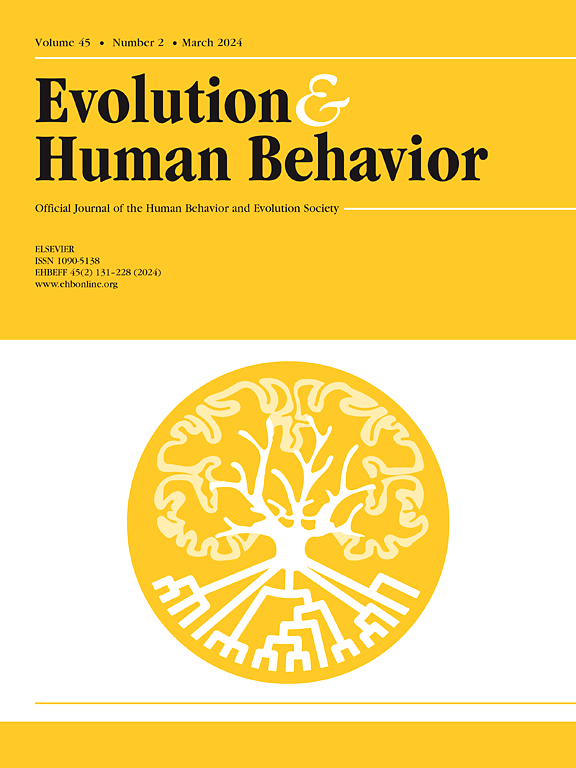Experimental evidence that people consider transgressors' exploitation risk when deciding to forgive
IF 3.2
1区 心理学
Q1 BEHAVIORAL SCIENCES
引用次数: 0
Abstract
On an adaptationist view of forgiveness, people's decisions to forgive transgressors are coordinated by a psychological system that estimates (a) the likely benefits of a restored relationship with the transgressor (called relationship value) and (b) the risk that the transgressor will impose additional harm in the future (called exploitation risk). Correlational evidence supports these claims, but experimental evidence is limited. Here, we used a novel experimental manipulation of exploitation risk, along with well-established manipulations of post-transgression communication, to evaluate claims about the effects of exploitation risk on forgiveness. We also evaluated whether the effects of post-transgression gestures of apology-compensation and antagonistic messages on forgiveness result from their intermediate effects on perceived exploitation risk. The manipulations of exploitation risk and post-transgression messages influenced self-report measures and behavioral measures associated with forgiveness in theoretically expected directions, and a standard measurement-of-mediator approach suggested they operate via their intermediate effects on exploitation risk, but experimental tests provided only limited support for that claim. We conclude that exploitation risk does indeed deter forgiveness, but we will find little unambiguous causal evidence that antagonistic messages and expressions of apology-compensation exert their effects on forgiveness via their intermediate effects on perceived exploitation risk.
实验证据表明,人们在决定原谅时,会考虑冒犯者的剥削风险
在宽恕的适应主义观点中,人们原谅冒犯者的决定是由一个心理系统协调的,这个心理系统估计(a)与冒犯者恢复关系的可能好处(称为关系价值)和(b)冒犯者在未来施加额外伤害的风险(称为剥削风险)。相关证据支持这些说法,但实验证据有限。在这里,我们使用了一种新的剥削风险实验操作,以及一种成熟的犯罪后沟通操作,来评估剥削风险对宽恕的影响。我们还评估了过失后道歉补偿姿态和对抗性信息对宽恕的影响是否源于它们对感知剥削风险的中间影响。剥削风险和犯罪后信息的操纵在理论预期方向上影响了自我报告测量和与宽恕相关的行为测量,标准的中介测量方法表明它们通过对剥削风险的中间效应起作用,但实验测试仅为这一说法提供了有限的支持。我们的结论是,剥削风险确实会阻碍宽恕,但我们发现很少有明确的因果证据表明,敌对信息和道歉补偿的表达是通过对感知剥削风险的中间效应来影响宽恕的。
本文章由计算机程序翻译,如有差异,请以英文原文为准。
求助全文
约1分钟内获得全文
求助全文
来源期刊

Evolution and Human Behavior
生物-行为科学
CiteScore
8.30
自引率
9.80%
发文量
62
审稿时长
82 days
期刊介绍:
Evolution and Human Behavior is an interdisciplinary journal, presenting research reports and theory in which evolutionary perspectives are brought to bear on the study of human behavior. It is primarily a scientific journal, but submissions from scholars in the humanities are also encouraged. Papers reporting on theoretical and empirical work on other species will be welcome if their relevance to the human animal is apparent.
 求助内容:
求助内容: 应助结果提醒方式:
应助结果提醒方式:


